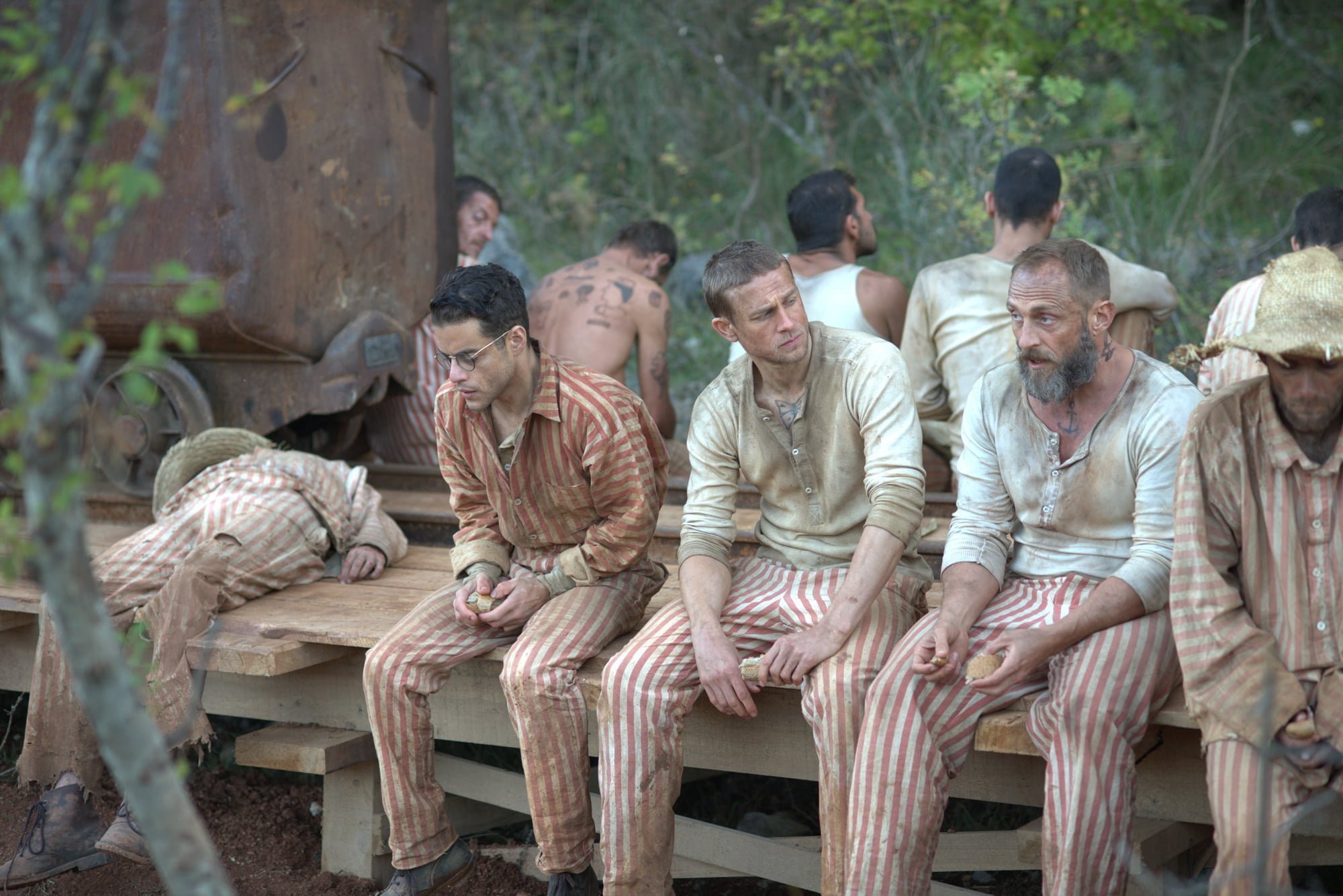While a remake of the 1973 Steve McQueen and Dustin Hoffman prison drama classic Papillon wasn’t something audiences had been clamouring for, Danish filmmaker Michael Noer’s take on the material deserves credit for being a well made bit of macho man brutality and drama. This second adaptation of the heavily disputed autobiographical novels of former thief Henri “Papillon” Charrière that focus on time he served in a decrepit prison colony hasn’t been made with any desire to reinvent what’s already been done before. It’s not a film that was remade because someone thought they could do it better. It’s the kind of remake that seems to have been made because all parties involved thought it would be a good idea. There are worse reasons to do a remake, and at least Papillon musters enough suspense and good ideas of its own to warrant existing.
Framed by a ticked off crime boss for the murder of a Parisian pimp, Charrière (Charllie Hunnam) was sentenced to a lengthy prison sentence at a penal work colony in French Guyana in the 1930s. The purpose of the prison is to make the country easily inhabitable for future French settlers. Once the prisoners have served their sentence, they will not be transported back to France and will remain in the country as labourers and settlers. The prison itself is bare bones, brutal, and packed to the rafters with any number of violent scoundrels. The chances for escape are slim to none; if you don’t die in the jungles from starvation or the local wildlife, you’ll surely die in the rocky oceans. On the inside, Papillon meets and befriends Louis Dega (Rami Malek), a wealthy forger who got pinched for writing up counterfeit defense bonds. Knowing that the meek and easily broken Louis will be a target for the amount of money he carries on him (in what could charitably be described as a “less than convenient place”), Henri makes it a point to protect the man. In exchange for protection, Louis agrees to bankroll and assist in any escape attempts they might want to undertake.
The original Papillon was a passion project for Steve McQueen, who at the time of its production was starving for more serious minded dramatic work. This updating from Noer and screenwriter Aaron Guzikowski (Prisoners, Contraband) feels less like something that has been made with driving desire and more like it was made by people who had a passing affinity for the original. With a few exceptions, this new Papillon is a rather straightforward and literal reinterpretation of what’s already been accomplished. Those who’ve seen and adored the original film will get more of the same in a similar order and fashion as the 1973 take on nearly identical material. While it isn’t a shot-for-shot or scene-for-scene redux, there’s an unshakable familiarity that drags things down somewhat.

Guzikowski’s script lacks the necessary oomph and drama to distance Papillon from the memory of its predecessor (or to mask the material’s tricky start-stop-and-start-again structure), but Noer manages to create a different sense of style and atmosphere. His style on the whole isn’t particularly flashy, which contrasts nicely to the overall griminess of the Guyana jungles and cliffsides. Working in a modern era of filmmaking means that Noer is free to ditch all morals and decorum for a period piece prison flick that’s appropriately bloody and grotesque. If anything has been improved upon here it’s an overall sense of misery and dread, and while that sounds like a strange compliment, it’s completely appropriate when talking about a prison film. Noer thankfully maintains the original film’s sense of strangeness, never jettisoning borderline experimental asides where a solitary confined Papillon descends into moments of psychosis. Noer also displays a true knack for making set pieces come to life, with Papillon’s daring mid-movie escape attempt through the jungles striking as some nicely crafted and suspenseful filmmaking. The script might not elevate anything, but Noer’s certainly trying.
Hunnam makes for a perfect replacement for McQueen, cutting an imposing presence, physically transforming himself, and bringing a roguish charm to what could have been a repellant and selfish character. Papillon is a perfect use for Hunnam’s particular set of acting skills, but the always reliable Malek’s character has been scaled back from what Hoffman was able to do in the original. While Malek does what he can and generates a fair bit of audience sympathy, his talents are woefully underutilized until the final act, and even then he’s mostly relegated to reacting to the actions of other characters, most notably an exceptional Roland Møller as a sketchy hard man who gets involved with their escape attempts. They make for a good pairing, but there’s a decided imbalance in the casting.
Film critics are taught that comparing movies to other previously indebted works – even in the case of remakes – isn’t fair, and all movies should be approached as a clean slate. Such advice flies out the window when considering a film like Papillon. While it’s certainly a good film on its own merits, it mostly serves as a reminder of a better movie that’s already out there and more or less the same exact thing. If you haven’t seen the original Papillon, Noer’s remake could offer a lot of excitement and drama. If you have, at least you’ll get a something that’s familiar, but not half bad.
Papillon opens in cinemas everywhere on Friday, August 24, 2018.
Check out the trailer for Papillon:
Join our list
Subscribe to our mailing list and get weekly updates on our latest contests, interviews, and reviews.

